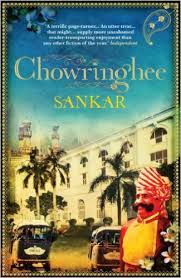 What happens when a “wide eyed adolescent from the small neighborhood of Kashundia who had, years ago, crossed the Ganga on the steamer Amba from Ramkeshtopur Ghat to gape at the High Court” secures a job with a British barrister and earns the affection of one and all only to be reduced to a life of penury when the barrister expires? Well, he ends up behind the reception desk of one of the most revered hotels of colonial Calcutta, the Shahjahan. And through his eyes the readers see the world with its many secrets that remain buried behind its imposing facade.
What happens when a “wide eyed adolescent from the small neighborhood of Kashundia who had, years ago, crossed the Ganga on the steamer Amba from Ramkeshtopur Ghat to gape at the High Court” secures a job with a British barrister and earns the affection of one and all only to be reduced to a life of penury when the barrister expires? Well, he ends up behind the reception desk of one of the most revered hotels of colonial Calcutta, the Shahjahan. And through his eyes the readers see the world with its many secrets that remain buried behind its imposing facade.
The narration is in first person (Shankar an almost namesake of the author himself) and the diction one of extreme simplicity but with strong emotions. Through his story telling, the author infuses life in the hotel and makes it the protagonist of the novel. All the characters – the enigmatic hotel manager Marco Polo, the endearing Sata Bose, the other myriad residents of the top floor of the Shahjahan, collectively impregnate the concrete walls of the hotel with life and their idiosyncrasies keep the reader glued to the pages of the book. When Sata Bose narrates the below lines, he draws that beautiful analogy between the hotel and life by alluding to the fact that the longer you live the more you ‘pay’ just like in a hotel.
Our life is but a winter’s day. Some only breakfast and away, others to dinner stay and are full fed, the oldest man but sups and goes to bed, he who goes soonest has the least to pay.
The novel is set in the 1950s post colonial Calcutta (which it was called then), inside the premises of the famed Shahjahan hotel with a European at the helm and a medley of Indian and Europeans on the staff list. The clientele of the hotel ranges from the outrageous to the docile with motives of clandestine rendezvous to social braggadocio. Sankar deftly brings to forth the constant strife of human existence through the by-lanes of emotions – love, treachery, lust, through the tales of the transient guests and the more permanent staff. Every character that he has chosen plays their part in a remarkable rite to passage of Shankar into the glitzy but shadowy world of Shahjahan. The glamorous yet naive air hostess Sujata Mitra, the Goan singer Gomez who might have gone past his prime but in spirits remains as fresh as the melodies of Mozart and Beethoven, Karabi the beautiful hostess for the guests of Suite No. 2 and of course Bose-da, the effervescent receptionist who was obviously much more than that – all of these create a mesmerising net that keeps the reader caught in its confines. And for those who have lived a part of their lives in Calcutta (the now Kolkata), this story takes you back to the streets and the landmarks of the city’s transcendency.
The sun does set occasionally on the British Empire, sir, but the lights never go out in a hotel.
Read this book for the fluid narration and the naivety of expression to convey the most complex of emotions and create a full bodied piece of prose which leaves a rich after taste much after you have savoured it.
My rating : 3.5 / 5
Buy the book here Chowringhee by Sankar







